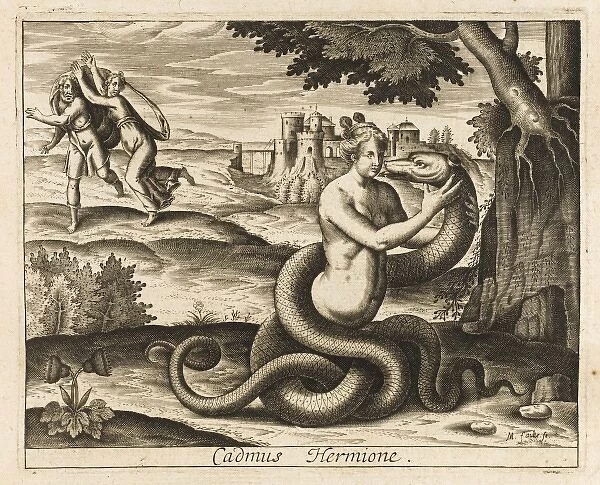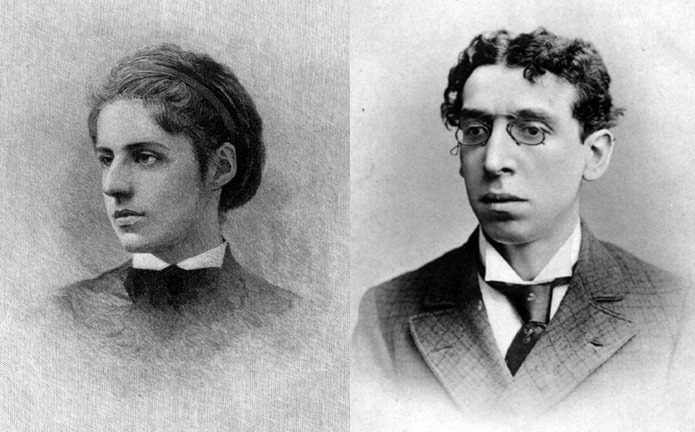Translated by Alexander Jacob
Ernst Niekisch (1889–1967) was a German writer who first belonged to the Social Democratic Party of Germany and was vigorously opposed to the Western powers represented by the Treaty of Versailles and the Locarno Treaties. In his belief that the strongest opposition to the decadent West would be an alliance of the Prussian Germans and the Russians he formed his own political circle called “National Bolshevism.” His National Bolshevist ideology was expressed in various articles that he published in his own journal Widerstand and in the books he wrote between 1925 and 1931. In 1932, he published a study of Hitler’s movement called Hitler: ein deutsches Verhängnis (Hitler: A German Calamity) and in 1935 the present work, Die dritte imperiale Figur. In light of his opposition to Hitler as a bourgeois demagogue, his journal Widerstand was banned in December 1934 and he himself was arrested in 1937. He was convicted of literary high treason in 1939 and sentenced to life imprisonment. After his liberation by the Red Army in April 1945, he turned to Marxism and lectured at the Humboldt University in East Berlin. He soon became disillusioned with the oppressive policies of the East German government and moved to West Berlin in 1953.
In his book on imperial historical figures Niekisch focuses on what he describes as:
political figures whose playing field reaches far beyond the borders of spatially and temporally bound states; they are the real supra-national figures. Their ordering vision encompasses the world; their ordering will deals with all of humanity. (ch.1)
Niekisch identifies the two major ancient imperial figures as the Roman and the Jewish. Ancient Rome had risen to be a world power because of its excellent state-building and legal creative capacity. The second power that emerged in the Mediterranean, the Jewish, was essentially an economic phenomenon. Following the philo-Jewish and anti-Christian thinker Friedrich Nietzsche,[1] Niekisch falsely identifies the introduction of Christianity as a Jewish ruse to undermine the Roman Empire. However, we know that the Jewish attempt to attack Rome was consolidated not in Rome but in Jerusalem itself, during the First Jewish-Roman War, when the Romans finally destroyed the Temple in A.D. 70. And Niekisch himself identifies the eternal Jew with the “economic ratio (reason)” rather than with a religious one.
Once introduced into the Roman world, the new Christian religion was absorbed by Rome so that the eternal Roman continued to prevail in a form that added theological speculation — as dogma — to the ancient Roman political prowess. The Jewish economic ambition, on the other hand, is seen to be essentially opposed to the Roman imperial forms, pagan as well as Christian, and can succeed only by destroying the Roman social bonds. This dissolution was achieved in the English Revolution, the American Revolution and the French Revolution, which seriously impaired the traditional aristocratic holders of the Roman imperial power in the West and ushered in the rule of the favoured Jewish social type, the bourgeois.
The agencies through which the eternal Jew henceforth operated were Democracy, Humanitarianism, and Freemasonry, which serve as the political, social and religious institutions of the bourgeoisie. However, even though the economic reason embodied by the eternal Jew has its own institutional framework, it is essentially an immoral one, unlike the legal reason and the theological reason of the eternal Roman. As Niekisch points out:
Even the mechanism of financial economics is an intellectual system such as the legal proposition and dogma are. Only, it invokes another human elementary realm. The legal proposition relates to the sense of order, the dogma to the need for belief, but financial calculation to human self-interest. The Jew speculates on the “lowest” instincts in order to arrive at the imperium that is promised to him at the End of Days and that would essentially be the Jewish monopoly rule over the world market. (ch.8)
The bourgeois types that evolved from the intrusion of the Jewish economic reason into European society are represented in England by the “gentleman” and in France by the “citoyen.” The former is a mixture of the Viking “barbarian” with the eternal Jew and the latter a mixture of the eternal Roman with the eternal Jew.
Germany, however, did not succeed in developing its own classic type of bourgeois. Both the Germans and the Russians are considered by Niekisch as mainly “barbarians” whom Rome once fought against and later civilized. The German barbarian, according to Niekisch, is constituted of peasants and warriors. Already during the Roman Empire, the Germanic warriors only entered history as mercenaries for Rome. The German Holy Roman Emperor too “never disguises his “barbarian’ origins”. And in modern times the Junkers have gradually lost their military excellence and fallen victim to the rising bourgeoisie.[2]
The Prussian and, especially, Russian peasants are the elements that Niekisch pins his hopes on to develop into a “third imperial figure.” However, Niekisch’s reliance on the worker and the peasant, in Prussia and Russia, is rather groundless since he himself acknowledges that the peasantry — as well as the barbarian warriors — have always been absorbed by one or the other of the two imperial figures:
But the peasant, who does not enter the contest at all, has always been absorbed by the imperial figures: to the Roman he gave his tenth and to the Jew his usurious interest. (ch.9)
Besides, the Peasants’ War of the sixteenth century had given the eternal Jew an opportunity both to curb the German warrior spirit in the fight against Rome and to initiate the process of transformation of peasants into “workers”:
When the Catholic Church, in the course of its secularization, had regained such a high degree of Roman purity that primordial Germanic instincts began to mobilise against so much Roman exclusivity, the Jewish-Christian elements sailed in the winds of Germanic anti-Roman affects; the eternal Jew allied himself with the eternal barbarian against the eternal Roman (ch.11)
At the end of the Peasants’ War:
The defiant self-confidence of the barbarian that the latter displayed when he had seen the Roman weakened was once again curbed; he was once again made tractable. The first section of that “process of producing workers” that gradually reduced the peasant to a proletarian of the capitalistic society had been successfully accomplished. (ch.11)
The industrial worker is thus essentially an extension of the barbarian peasant. Niekisch hopes that, in the modern world, the industrial workers will ally themselves with the unspoiled Slavic and Tartar peoples and constitute a third imperial figure, the technological “worker.” Niekisch’s “third imperial figure” is inspired by Bolshevist notions as well as by Ernst Jünger’s modernist and futurist conception of the technological worker in his 1932 work Der Arbeiter. Niekisch’s ideal of a “third imperial figure” fortified by modern technological skills who will be able to supersede the eternal Jew and the eternal Roman is, on the whole, rather a vain fancy considering that modern technology, like the earlier mechanical industry, is only a handmaiden of the bourgeois commercial interests. As Niekisch himself notes, industrial and technological advances are never indeed the main aim of the Western civilization that has come under the spell of the economic reason:
The technological apparatus is, as elaborately as it may have been constructed, only a Western by-product; it was never directly aimed at; it was a means of the economic goal. For the European-bourgeois man the mechanism of the free-market economy was the natural element of his self-development. (ch.45)
If Niekisch’s choice of the technological worker as the third imperial figure is basically flawed, his belief in the international socialist claims of Communist Russia is also based on a Romantic, Dostoevskyan, view of the Russian peasants as being especially suitable for the spread of international welfare:
The Slavic elemental drive to the whole world and all of mankind would be the impetus that lends political penetrating power to the new imperial figure (ch.46)
And again,
The eastern peoples, the Slavs and Tartars, are for the imperialist tendencies that the European worker embodies in a pure but only in a wishful-powerless manner the raw material that endows the latter with dynamic invincibility. (ch.45)
Niekisch, clearly wrongly, believes that the “anti-bourgeois and eastern peoples” can subdue the economic reason through the technological reason:
For the European-bourgeois man the mechanism of the free-market economy was the natural element of his self-development; for the anti-bourgeois worker and the eastern peoples, on the other hand, as a result of the accord of their characteristic orientation with the apparatus, the technological structure will be that element. The economic realm will be transformed by subjecting it to the dictatorship of the technological realm. (ch.45)
In general, Niekisch’s choice of the industrial and peasant “barbarians” as his new human type is a rather fanciful one since this social stratum, whether German or Slavic, cannot quite compete with the much more developed middle-class stratum in which the eternal Jew operates. In this context, I may also add that what Niekisch decries in his 1932 book Hitler: ein deutsches Verhängnis, namely, Hitler’s bourgeois and southern German, Catholic style that easily accommodated itself to Italian Fascism, is indeed one of the virtues of the National Socialist movement. For, what Niekisch fails to understand is that the bourgeois himself is not evil but only insofar as he allies himself with the revolutionary Jewish element that seeks to destroy the imperial Roman element, pagan or Christian. In fact, since Niekisch discounts a truly imperialistic impulse in the German barbarians, whether as warriors or peasants, and his hopes of a new imperialism are based on Pan-Slavist fantasies, there remain only the eternal Roman and the eternal Jew as the two longest lasting “imperial” figures. As he himself rightly points out:
One can understand the European political, national, cultural and economic history since the rise of Christianity from the viewpoint that it is the battle between the “eternal Roman” and the “eternal Jew” for the “eternal barbarian.” That is a battle that extends over centuries: one nation after the other becomes embroiled in it and becomes the object of attack of both the imperial figures. (ch. 9)
One may even extend a critique of Niekisch’s ideology a step further by questioning whether the negative, destructive and revolutionary character of the eternal Jew makes him a truly imperial figure at all and if there is not, consequently, in the history of Europe, really only one eternal imperial figure — the Roman.
The Eternal Roman and the Eternal Jew
Chapter 1
There is a historical human type of universal scope; they are political figures whose playing field reaches far beyond the borders of spatially and temporally bound states; they are the real supra-national figures. Their ordering vision encompasses the world; their ordering will deals with all of humanity. They feel bound to a mission that commands them: “Go throughout the world.” They do not wish to form one nation but all nations; they are in a comprehensive sense “international.” Their glance extends to the most distant horizons. Nations and states are merely “provincial” within their range of vision. By establishing an empire for all nations, they establish “peace on earth.” Their empire is an international empire; their rule is world rule. They are, in the highest sense, “imperial.” They are “mythical” figures insofar as their current human embodiment seems always to be only an imperfect aspect in which they project into the earthly reality from an eternal realm. They never identify themselves with the tangible human existence into which they enter; they are more than the latter; they point to the backgrounds, reserves, and dimensions for which the greatest man is still much too small and limited. In the imperial figure is comprehended in a pure way the will to world ordering and world rule which in its fleshly-human incarnation is represented in a broken, extremely distorted, obscured and submerged way. Just as its space is the entire earth, its time extends over centuries; there lies a shimmer of infinity as well as of eternity over it. The “eternal Roman” and the “eternal Jew” are two imperial figures that stride our historical space with a very slow breath and immeasurably long strides.
Chapter 2
The birth of the “eternal Roman” occurred in the light of history. Rome arose in the middle of the Mediterranean Sea, of the world that the “civilised” white man knew and surveyed at that time. Its position lent Rome the prospect of becoming a leading and real centre. The position itself lent to the city, to a certain degree, the mission to become, from a local and provincial structure, an international one. One can observe step by step how this transformation, this rise, occurred. Scipio Africanus[3] was the man who, in opposition to Cato[4] and the landed aristocracy thinking within the bounds of their estates, effected the imperial change and breakthrough. Carthage was the only comparable rival of Rome; the decision hung on the razor’s edge when Hannibal stood at the gates.[5] No other Roman understood so deeply as Scipio Africanus what was at stake between Rome and Carthage. Whereas Rome was hurt by the fear of the Punic invasion into Italy, Scipio conceived the plan of establishing Roman rule over the western Mediterranean basin. With incomparable boldness he strove ten years later for the subjugation of the eastern Mediterranean region. The aristocratic senate had never desired an international rule over Europe, Asia and Africa. Scipio forced it to leave the perimeter of self-sufficiency and to enter on the road of great history. The senate followed him only with reluctance and resistance; Cato defended the traditional self-restriction of the good old times against the dangerous seducer to an imperial adventure. Scipio Africanus learnt that no political leader can be popular who delivers his nation to the unrest, uncertainty and the adventures of a great historical existence. His end, like Bismarck’s end, was plunged into an atmosphere of gloomy, sad bitterness.
One who wishes to rule the world cannot rest in a binding to a land. The emperor must stand above all things that he commands, also stand above the field that bears fruit; he cannot stick to one place just because he is rooted in it; he must be mobile in order to be able, according to practical necessity, to step in and seize everywhere. A nation that wishes to rise to those heights in which an empire matures must brush away the heavy soil that reaches to the depths. In the countryside, one lives only under politics; but an empire is the most perfect creation of a politically passionate will. A nation must overcome the peasant in itself before it can become the ruler of the world. The centre of the international sphere can only be places in the countryside that are freed from agriculture and the peasantry in which all strands run in the same direction and from which all energy currents radiate. Imperium dissipates national culture; it mixes everything together, from the east and the west, from the north and the south. Every ancient people that enters the force-field of imperium is consumed, melted down, burnt to ashes. The end-result is an undifferentiated, levelled mass. Nations disappear where empires arise. The Roman world empire swallowed several nations; it sustained and renewed itself through the sacrifice of its own values that every nation had to bring that was subject to Rome, whether through violence or voluntarily. Finally, the actual city of Rome lost to a certain degree the reality of wood and stone with its jumble of streets and bundles of men, the soil under its feet; its political influence no longer depended on its being physically present anywhere but on its having become an idea. The will to rule and order that arose in this city, which extended from it outwards, powerful in its form, over land and sea asserted itself as a spiritual reality, made itself independent of space and time as a pure principle and raised the claim of being the real Rome, in comparison with which the city of Rome became unimportant and inessential. The idea of Rome became the shining symbol of international political greatness; the city of Rome, in comparison to it, remained as an earthly relic, as — perhaps — as desiccated dross.
When Caesar had conducted the Roman rule to its peak, the idea of Rome rose radiantly above the political-geographical reality of Rome and developed its special existence. Now there matured the incomparable legacy of Rome which the Roman imperium bequeathed for some centuries: the Roman model that it had proven in a perfect way, the experience of its lasting and self-preserving world rule, the memory of its noble moments, deeds and performances, the example of its ordering law, the pax romana of the Imperial age, the work of its civilisation, the experience of the unity and equality of the human race. A human type was stamped that was no longer lost to the memory of mankind; even today hearts beat everywhere that are receptive to the resonance of the Roman profession: civis romanus sum. It is the human type that is able to possess power and to exercise power, who is born for power and who merits rulership because he is able to use it with mastery. The historical proofs of his deeds continue to have an effect and keep his memory perpetually alive and present. This human type has ennobled the place where he arose for all times; Rome itself, the city of Rome, seems, ever since, as a “chosen” city to which it is easily granted that it is the seat and residence of the “highest authority.” Eternal Rome is the undying obligation to which the eternal Roman is bound: a mission of world rule has been placed on him and it is his duty to fulfil this contract in the forms that are suited and adapted to changing times and circumstances.
Chapter 3
The Jew too grew into his international form from a narrow province. It was a dangerous territory in which he had settled after his exodus from Egypt; he lived on the bridge between Asia and Africa that connected the Babylonian, Assyrian and Persian world empires with Egypt. Palestine was, for the great powers of antiquity, a politically important region; it was not a matter of indifference to what zone of political influence it belonged. The Jews were more victims than beneficiaries of their territory that was politically so important. The gift of this special and excellent situation of their area of settlement was, unlike what it was for the Romans, not a brilliant but a disastrous history. The Jews did not succeed in any powerful political creation; when the ambition for such a thing awakened among the Judges and Kings there was announced at the same time, through the mouths of the prophets, the mistrust of any independent path. The age of the Judges and Kings remained an unsuccessful episode; in the extreme affliction, in the Babylonian imprisonment, the Jewish people relinquished political accomplishments but armed themselves to assume on another level the battle for an international position.
The priest, who had already stood in opposition to the Judges and Kings, assumed exclusive leadership; he developed an unusual system of priestly politics. The people had been pushed to the edge of the precipice; the priest offered assurances that even in the future the people would be able to withstand the most extreme oppression. He filled them with the feeling that they were the people chosen by God. God’s interest in mankind was directed solely to the Jews. The remaining part of humanity was condemned in the eyes of God; its destiny was to be delivered one day into the hands of the Jews. Judah was chosen as the navel of world history; now one could understand the latter only if one knew that it revolved around the Jews.
The blows of fate that Judah suffered, his political misfortunes, the misery of his subjugation to foreign power-holders suddenly acquired a rampant, inciting significance: God chastised his people because it had erred from its divine destiny. It could obtain a change for the better by atoning — by remembering its chosenness again. The idea of divine chosenness became biologically ingrained; it was the divine will that the Jewish people should maintain themselves in their special racial nature; a “legal fence” was erected that separated Israel from the other peoples; in the Jew was kindled a fanaticism to reject “everything that leads to a mixture with the surrounding peoples or to assimilation.” If the Jew upheld the consciousness of his divine chosenness and remained true to the divine commandment of racial purity, then he would sit in a vehicle in which he could survive all historical storms and which preserved him from the dangers of downfall and disappearance. There was no disaster before which he needed to despair. He was being preserved for a glorious future; he had a divine promise to himself. It was the promise of world rule. “Take care not to form an alliance with the inhabitants of the country into which you enter” (Exodus 34). “And I will make you a great nation and I will bless you and make your name great” (Genesis 12). “And kings shall be your caretakers and queens your nurses. They will fall on their faces to the ground before you and lick the dust off your feet” (Isaiah 49).
But the priestly hero, who will bring about the establishment of world rule, is the Messiah. The Messiah is a figure of longing; the misery and humiliation of the present are easier to bear so long as the belief is not damaged that he, the Messiah, will come at the end of time, and raise the demeaned over all the nations of the earth. The Jewish Messiah is an ideal figure of religiously coloured hope; he is the image of a leader that the millennarian religious hope creates for itself. It is the counter-image of the Roman Caesar, who is a phenomenon of the highest historical reality and the richest and most effective fulfilment. The Messiah is as “otherworldly” as the Caesar is “thisworldly.” The Caesar lives in the memory, the Messiah in dreams. The Caesar is a legacy, the Messiah a promise. The Caesar is a monument of possession of power that has been enjoyed, the Messiah a vision of feverishly excited desire for power. The Caesar left behind immortal notions of power; the Messiah promises enjoyment, happiness, prosperity, and pleasure in Paradise. The Caesar “civilises” the nations, the Messiah leaves them to his chosen people as their servants, slaves and creatures to be exploited.
The yoke of Roman rule was Judah’s harshest test; the belief in the Messiah heated itself to a white glow. The destruction of the Temple was meant to rob the Jews of their support and position, the diaspora uprooted them and made the sources of their life-force dry up. But precisely the destruction of the Temple and the diaspora moulded the Jew in that existential form in which he became capable of the exercise of functions that penetrate the world. Before the destruction of the Temple, he had stored up, within a narrow space, enormous tensions; they could not be translated into historical influence from Palestine. Through the diaspora the Jew was scattered as an energetic element throughout the world; here he could henceforth develop unforeseen and incalculable effects. The uniformity of his biological basic substance, the solidarity in the exultation of his chosenness and in the fervour of his hope for a Messiah brought forth a uniformity of character orientation and a commonalty of values, both of which never released even the most isolated Jew from their spell and gave his dealings a steady guideline and a reliable rule. Even when he was left exclusively to himself and moved out of himself all alone, he nevertheless served the common Jewish interests; his own movements coincided always with the total movement of Jewry. Where a Jew entered there was expressed at the same time naturally also the special standpoint of Jewry.
In this way the Jew had become an imperial figure, the “eternal Jew.”
Chapter 5
Judah overcame Rome, but Rome was nevertheless not dead. The Roman spirit, the Roman attitude, the Roman political sense and Roman will to order, were not eradicated; when they felt that they were beleaguered and undermined, they joined forces with the Jewish-Christian revolt, brought their tradition into the Jewish-Christian inundation and arrived, through manifold detours, at respectability once again in the counter-world. “Christianity,” Nietzsche remarks in his unedited writings, “arose from Jewry and nothing else; but it grew in the Roman world and sprouted fruits that are both Jewish and Roman.” The Christianisation of Rome was a victorious Jewish battle campaign but not, for a long time yet, a victorious Jewish war. The eternal Roman had been weakened, bent down, but he was still able to resist and self-willed enough not to let the eternal Jew enjoy his Christian revenge stratagem in peace for a couple of centuries.
Original Christianity was Jewish; the Christian Church Romanised itself from century to century. To the degree to which that occurred, it itself became a state; it replaced its sacramental law with the Roman corporate law and transformed itself from an institution of Evangelical grace into a legal institution. The state-building power of Rome controlled the anarchistic state-destroying spirit of Jewish origin. It was a political Roman instinct that made the Pope, during transfer of the centre of gravity of the Empire to Byzantium, remain in Rome and preserve for the Church the wealth that lay under the powerful authority of the Roman name. In the time of the Renaissance, the legacy of ancient Rome rose to the top within the Church itself; it had, by letting its Jewish component wither, become well-nigh “heathen.” The secularisation of the Catholic Church was in reality the breakthrough of ancient Rome in it; this breakthrough occurred at the cost of the Jewish-Christian elements.
The Christian Roman no longer coincided with the ancient Roman, but he remained nevertheless still a type of the ancient Roman. As much as the eternal Jew haunted him, so little was he ready to capitulate fully to him; indeed as the Renaissance had shown, it secretly even cherished the hope of becoming free of the Jew one day.
Chapter 8
World-rule demands that all opposing forces be incorporated, through superior intelligence, with penetrating expertise, into the total structure; as strong as the will that stamps the surrounding form is, so wise must the reason be that is able to absorb the elements in such a way that they all together feel that they are in the “right place” in the finished work. Every imperial figure works, according to its biological preconditions, historical traditions, political possibilities and temporal associations, with different means, interprets its task from a special angle. It makes use especially of those means that are essentially suited, to a special degree, to the imperial principle that is its own; in the use even of these means it gradually develops the highest mastery. Its reason operates especially in the special domain from which it derives its means of rulership; the imperial figure embodies to a certain degree the most experienced expertise of its predetermined specialised field. The imperial figure, its imperial principle, its practical means of rule, and its reason attuned to it, go together.
The greatness of the ancient Roman was his state-building genius; his productivity proved itself in the solution of tasks of political ordering and legislation that are illumined with the glow of immortality. Since then, nowhere has the legal creative reason reached such a peak again. The extremely sophisticated legal creative reason perfected the imperial influence and the imperial success of the ancient Roman; the latter is, as an imperial figure, the most perfect instrument that legal creative reason has up to now attained.
In the Roman Christian, legal creative reason underwent a characteristic alliance with theological speculation; the gates of the kingdom of heaven were thrown open, but the image that was offered to the pious eyes was a metaphysical state. In Augustine’s City of God,[6] Caesar has as much a share as the Messiah. The Roman theology is one half worldly political, the other priestly-theological legal science. As a theologian, one referred as much to Roman law as to the Holy Scriptures. One was a mixture of Roman lawyer and Jewish priest. In this way, one ruled the souls; and in this way, one incorporated the worldly states into the total order of the ecclesiastical imperium. The fruit of the theological-legal coupling was dogma; it is a law as compulsory as a divine mystery. Scholasticism developed dogmatic-theological reason to its final possibilities. Rome had become the centre of dogmatic-theological reason.
The eternal Roman, in his ancient as well as in his Christianised form, is a positive imperial figure insofar as, at every moment, he works directly at his imperium. In contrast to him, the eternal Jew is a conspirator whose universal nihilistic radicalism is still unbroken. He is at a stage at which he would like to bring things into his power not in order to order them but to disintegrate them into their atoms. He hides only in the preparatory work for his imperium; he cannot yet think of his imperium itself. His imperium will begin when nothing else, apart from himself, stands on its own feet, when there are no more intrinsic values, when it is he who sets his “value” on every living thing. The dictatorship that he imagines is a “dictatorship of prices” within a world in which everything is worth only so much as he “offers” for it. His world order is a universal commodity market which he mobilises with great profit. The world as an uncreative, Jewish-monopolised source of profit: that is his promised empire that the Lord Sabaoth holds in readiness for him. One who knows how to read the Prophets has no doubt that they hope from their God to obtain authority for the exploitation of everything that is not Jewish.
The instrument of the Jewish will to power is money; so long as there are still things — values and men that are not unconditionally saleable — the Jewish power still has restrictions. The Jew prepares his imperium by pulling down these restrictions. He wishes to “economise” the world in order to receive it in this way entirely into his hands. It is an inscrutably profound Jewish saying that “Economics is destiny.” Where economics is destiny, the Jew is on top; for his strength is economic reason. He brings all processes and relations, circumstances, and developments into the formula of financial calculation, of trade and haggling. The economic view of history is the worldview that one must have if one views the world from a Jewish standpoint. If the content of life is nothing but economics, then it will not be long before a Jew becomes the ruler of life. The will to imperial power chooses machinery that is at a particular time best suited to it; what the legal proposition was to the ancient Roman, what dogma was to the Roman Christian is, for the Jew, the machinery of monetary economics. Legal propositions, dogmas and money are the established major means of imperial rule; they are like nets in which entire nations are caught and in which then their identity is stifled and their natural growth withers.
The Jew likes to veil his existential connection to economic reason; he would like to attribute the good relationship he has to the latter to coincidence. He [claims he] has come so far in financial matters because he is imprisoned in the ghetto, because all other professions were closed to him. That is a cheap interpretation; nowhere else, in all of historical experience, has the fate of isolation and rejection made itself pay off in such a splendid way. It is detrimental to the Jewish future if one discovers that one paves the way to Jewish rule where one surrenders oneself to the leadership of economic expertise; that is why the Jew vehemently denies that for economic reasons one must tolerate him as inescapably as one must, within the framework of dogmatic-theological reason, the Roman.
One can hardly neglect the Jewish self-analysis that was left behind by Karl Marx, who was nourished on the deepest and most secret strata of the Jewish substance. “What is the worldly basis of Judaism?,” he asks. “Practical necessity, self-interest.”
“What is the worldly religion of the Jews: haggling. What is his worldly God? Money?.” “Money,” he continues “is the jealous God of Israel before whom no other god may exist. Money debases all other gods of man — and transforms them into a commodity.”
To be sure, as informative as the Jewish self-analysis of Karl Marx is, it still does not penetrate into the deepest and most decisive secret. The Jew is an imperial figure because he is moved by a powerful feeling for the world, because he is filled with a powerful fervour for world domination and world exploitation; he lives in the immediate certainty that the world is the inheritance that one day must fall into his lap. His unshakeable belief in the promise that was made to him is the reflection of the belief that, at the bases of Jewish existence, there is an impulse at work aimed at brining the world into his power that strides into the infinite and is sure of itself. Haggling and monetary calculation are the forms in which this feeling for the world and this worldly impulse are realised; they are the battering rams and explosives with whose help the system of order of the Roman will to world-rule should be smashed and moved out of the way.
Even the mechanism of financial economics is an intellectual system such as the legal proposition and dogma are. Only, it invokes another human elementary realm. The legal proposition relates to the sense of order, the dogma to the need for belief, but financial calculation relates to human self-interest. The Jew speculates on the “lowest” instincts in order to arrive at the imperium that is promised to him at the End of Days and that would essentially be the Jewish monopoly rule over the world market.
Chapter 9: The Eternal Barbarian
The eternal barbarian appears, largely, in two forms: as a peasant and as a warrior. They go back to two original forms: to the settled peasant cultivating animals and plants and to the boldly striding, booty-seeking original hunter.
The peasant remains in the country; he does not venture beyond his boundary; he does not have the ambition for great rule. It is enough for him to be “king in his court.” He is bound by traditional habits and customs; his practical understanding is preserved and restricted to the matters of his daily farming activities. He is not an “intellectual.” His “mind” does not inquire about and ramble in the limitless and infinite; he is silent in respectful self-restraint before that which is present and has a long past. The peasant distrusts the “mind”; he senses danger behind it. He tends to be afraid of the mind as of the serpent that wishes to seduce him into eating from the tree of forbidden knowledge because it envies him the bliss of Paradise. He listens to the voice of his blood; it, rather than the whispering of the mind, gives the orientation to the course of his life.
In this way the peasant character lacks the impulse to the universal and the centralised, which is always only a gift of the mind; it sticks to the specific identity of the “ancestors” and does not wish to be disturbed in the respectable customs of the homeland, of the narrow, trusted circle. It defends itself against the universal rule, the uniform style, both of which are at war with the diversity of natural things.
The state is a standardising form; it is in some sense always a violation of existing Nature and the tradition-bound blood by the mind and the law derived from it. Basically, the state goes against the instinct of the peasant; it is a puzzling burden to which the peasant of course submits but against which he constantly protests. For that reason, the peasant is not a political man; politics, which is acting under the point of view of political reason, moves on a level that is alien to him and is too distant. He has only a passive relationship to the state; the state subjects him to its laws, raises taxes and duties from him, rallies him to the flag; the peasant submits because he does not know how he might rise against the state and its power. Politics takes the peasant into its consideration; but he himself has little say in the assessment of the value that one wishes to apportion to him. He is the bearer of national culture; however, it depends on constantly changing practical political considerations whether national culture stands high or low in value.
The warrior has a more unrestricted ambition; it is not sufficient for him, as for the peasant, to maintain his identity and to hand down his inheritance intact and in good condition. He knows the intoxication of victory, the custom of commands, and the exhilaration of being a lord and to stand above people who are subjected to him. He learns that the force of the sword is capable of keeping men in discipline and order; he raises it to the principle of his political foundations. He creates violent empires, military states; he breaks the resistance of the subjects through the terror that he spreads; he forces people to tremble before the sharpness of his sword.
Military states have on occasion already reached extraordinary ranges: they seem to develop into world empires; but then they suddenly collapse. A lost battle would be impulse enough to bring them to a collapse. They never last longer than their principle, the force of the sword, sustains the reputation of invincibility. It is repeatedly confirmed that they are built on sand. Perhaps the warrior succeeds in scaling the imperial heights when the fortunes of war are propitious to him; but there every time he soon runs out of air; his breath is not imperial. He does not captivate men inwardly; he does not call on them to fulfil a mission: so they do not stand behind him through their own motivation and freewill. He does not bring them together in a common faith and does not organise them according to a great idea; he does not have any higher goals. He does not administer any spiritual values and has no spiritual mission; hence there adheres to his rule a character of external oppression, crudeness and brutality. The force of the naked sword operates clumsily compared to the legal creative wisdom, the dogmatic-theological reason, the agile economic understanding; it can bang on the table but it does not convince. Its barbarism is indeed based on the fact that it is intellectually backward. The warrior is the form of the “eternal barbarian” in which the latter would like to enter into a contest with the imperial figures. In this, to be sure, he has up to now come off badly every time; he was recently abused by the dogmatic-theological reason and then corrupted by the economic. But the peasant, who does not enter the contest at all, has always been absorbed by the imperial figures: to the Roman he gave his tenth and to the Jew his usurious interest. Faced with the imperial figures the “eternal barbarian” is helpless; if they are interested in him at all, he is always finally the stupid devil. From the standpoint of the imperial figure every nation that is still rooted in the land and autochthonous in general falls under the category of the “eternal barbarian”; it is precisely “barbarian” to the degree that it still contains in itself something natural that does not wish to be brought under a universal imperial rule. As the imperial figure strives to separate the peasant from the land and the warrior from the fatherland, it cuts off the umbilical cord that ties the peoples to “blood and soil.” The community based on blood is replaced by a civilisational, religious or intellectual community and attachment to the land by a commitment to cultural values, a creed or an intellectual attitude. The peasant should believe and pay interest, the warrior fight and bleed, nations should bring their supplies of substance and energy into the ’empire’ so that the latter may have nourishment.
One can understand the European political, national, cultural and economic history since the rise of Christianity from the viewpoint that it is the battle between the “eternal Roman” and the “eternal Jew” for the “eternal barbarian.” That is a battle that extends over centuries: one nation after the other becomes embroiled in it and becomes the object of attack of both the imperial figures. So long as the roots of a people are still unshaken the imperial figures share in the work of cutting them off; when that is done, then begins the tough and merciless contest in which will be determined which of the two imperial figures the nation in question should fall victim to.
Every nation has its own movement and its characteristic intrinsic tension against other nations each of which, in turn, is involved in its own way in the power struggle between the eternal Roman and the eternal Jew. Manifold are the forms in which the course of events may run here.
Slowly the autonomy of the special structure of the nations and states is forced from its original orientation in such a way that it increasingly coincides with the law of one imperial figure; it is carefully but deliberately incorporated from its particular course into the imperial course. In the meanwhile, the imperial figure disappears behind the specific life of the nations with which they entered into a community; this occurs however only in order to secretly and imperceptibly be able to penetrate to the very core of this specific life and from there then to set the nations into motion as the machinery of the imperial figure. The imperial figure is not wary of either time or devious routes; it has great patience which waits until that matures which was planned much in advance and designed with a long vision. It captures men inwardly; it sinks into these the seeds of viewpoints, attitudes, and values that, taken together, as soon as they have become full-fledged, the nations direct, to a certain degree voluntarily, into the paths that end in the empire of the imperial figure.
In all international wars the imperial figures are the laughing third; they stand so high above the national objects of contention that they take none of them seriously and do not get stuck in any of them. Since nothing is sacred to them that is sacred to the barbarians, they always stand above the situation and can cook their imperial soup in the fire of national conflicts. They never succeed in subduing and crippling the eternal barbarian through their own force; they encourage him to bleed himself until, worn out and exhausted, he sinks into their arms; they are masters of the principle: divide et impera. They encourage divisions until the moment that the strength of every element is depleted; then they hope to be able to cross the threshold of their empire that encompasses the entire emaciated, de-naturalised mankind.
From the standpoint of the contest between the eternal Roman and the eternal Jew, European history is condensed to a few lines extending through centuries. These seem to be the essential and decisive. The colourful and confusing details become blurred; they emerge only as strange squiggles of those long and continuous lines. They carry weight only as local events that receive their real significance only within the scope of a whole picture that extends temporally over two centuries and spatially encompasses now, beyond Europe, the entire globe.
Chapter 10
In the decades of the declining Roman Empire the German is the barbarian. His wild force is consolidated on the borders of the Roman Empire; he wishes to conquer, plunder and be the master. He does not come with a mission, he does not appeal to any intellectual principle, he moves deep below the peaks to which legal, creative, theological, and economic reason rise. He is driven by a surging surplus of blind vital energy; he storms forward on the basis of nothing else but the fact that he feels physically strong. He wishes to loot the works and products of Rome; they enchant him and increase his greed; he does not have his own idea of order. He comes as a robber not as a builder. He is, in achievement and intellectual scope, incomparably inferior to his victim. He is an elemental force that does not shape but conjures up catastrophes.
Rome is inwardly decayed; the form of the old imperium no longer guarantees any defence any more to the ancient Roman. The eternal Roman has, of course, made provisions: the Catholic Church is the structure that secures the ruling legacy of Rome which breaks the barbarians, through which the Germanic barbarian is once again subjected to the Roman discipline and order. The barbarian can be only a mercenary, he cannot be master of the world.
The Christianisation of the Germanic barbarians forces him into the service of Rome. It is a sacrilege; the German lets his most sacred thing be taken away; therewith his centre of gravity is transferred to an alien power; it is no longer based in himself. By kneeling before the most sacred thing of the Roman he leads a dependent life; the decisive focus of his orientation is of a Roman character, no longer Germanic. Christianity establishes a religious community that the Germanic barbarian discovers fully formed and into which he enters. He does not have any part in its origins; it is for him an alien spiritual landscape. By making himself at home in it he relinquishes his own specific spiritual homeland. Faced with the rule of the religious community the habits and customs of the tribe lose their rights. The tribe is the vessel of the heathen traditions; it must decompose as the German becomes more Christian. The Christian religious community gains ground at the cost of the heathen community based on blood. The German is removed from the blood-related basis from which he up to now derived his unrestrained natural barbarian strength. With Christianisation, the German is subjected to Roman control and tamed according to Roman customs.
Christianity also breaks into the realm of the Germanic social order as nihilism, just as it had previously broken into the political order of ancient Rome. The crime of the felled Thor Oak Tree stands, as a “Bolshevist” act, fully comparable to the destruction of the Roman Caesar statues. Of course, Christianity soon entered into a social community with the elements of Germanic society destroyed by it in order to bring forth a world of new forms — just as ancient Rome had previously mixed with Judah. The Reich was formed through the combination of Christian and Germanic barbarian elements in the region north of the Alps. The family was the locus of the dissolution process with which the blood-based community of the Germanic tribe was stricken; it is, socially, a balancing of Roman influence and the independence of the Germanic substance, just as the Empire also is politically.
The Empire is a Germanic modification of the Roman imperium. The tension between the Pope and the Kaiser is the basis of the fact that the Kaiser can never be so Roman as the Pope naturally is. The Pope is a perfect Roman; next to him the Kaiser never disguises his “barbarian” origins. The Germanic component that the Empire contains, insofar as it is never abandoned, is always an element of the protest against Roman alienation. The Kaiser, who fights against the Pope, betrays the fact that the German does not yet wish to become Roman, that it is already hard for him to be as Roman as he is. In all its greatness the position of the Kaiser as well as the nature of the Empire cannot hide German inferiority; just as the Kaiser gets his crown in Rome, the Empire obtains its most profound justification not from a Germanic idea but from a Roman. In the Reich the German lives under the eyes and under the spell of the eternal Roman. The greatest popes are the most markedly Roman; they leave no doubt of the fact that the German has only so much political credit as Rome grants to him. The German of the Empire is a creation of Rome to such an extent that Rome can humiliate him immediately in the most ignominious manner when he is overcome by a desire for independence. The forces of world events proceed in such a way that the end will be a walk to Canossa[7] or indeed to the scaffold in an Italian marketplace. Within the Empire the German is inextricably tied to Roman strings; he plays therein a role that has been intended for him by the eternal Roman. He is imperial not through his own but through a borrowed power; he is the instrument of an idea of rule that the eternal Roman has given him. He does not realise any German will to order: by ruling he serves Rome.
[1] Niekisch quotes extensively, in the fourth chapter not translated here, from Nietzsche’s On the Genealogy of Morals and Beyond Good and Evil.
[2] Niekisch’s indifference to the characteristic strength of Prussian statecraft is a contrast to the admiration of it expressed by Oswald Spengler in his 1919 essay, ‘Preußentum und Sozialismus’ and by Christoph Steding in his 1938 work Das Reich und die Krankheit der europäischen Kultur (see my English edition, The Reich and the Disease of European Culture, Uthwita Press, 2023).
[3] Scipio Africanus (ca.236-183 B.C.) was the Roman general who defeated the Carthaginian general Hannibal at the Battle of Zama (in present-day Tunisia) in 202 B.C.
[4] Cato the Elder (234-149 B.C.) was a Roman senator who took part in the Punic Wars against Hannibal. He served as quaestor to Scipio when the latter was proconsul. However, Cato was critical of Scipio’s extravagances and lack of discipline. It was Cato who ended some of his speeches with the sentence, Ceterum autem censeo Carthaginem esse delendam (I further think that Carthage must be destroyed).
[5] Hannibal (247-ca.182 B.C.) was a Carthaginian general who invaded Italy in 218 B.C. and defeated the Romans in several battles there. In 203 B.C. he returned to Carthage, where he was defeated by Scipio the following year.
[6] De civitate dei contra paganos (The City of God, against the Pagans) was a work of Christian philosophy written by St. Augustine of Hippo (354-430).
[7] Canossa is a town in northern Italy where the Holy Roman Emperor Henry IV did penance in 1077 by standing bare-headed in the snow for three days to reverse his excommunication by Pope Gregory VII.

 Swirled World: Jews portray poster-rippers as White-skinned and blonde
Swirled World: Jews portray poster-rippers as White-skinned and blonde Third World: in reality poster-rippers are overwhelmingly non-White
Third World: in reality poster-rippers are overwhelmingly non-White White-skinned Jewish victims from the propaganda-video:
White-skinned Jewish victims from the propaganda-video:

















